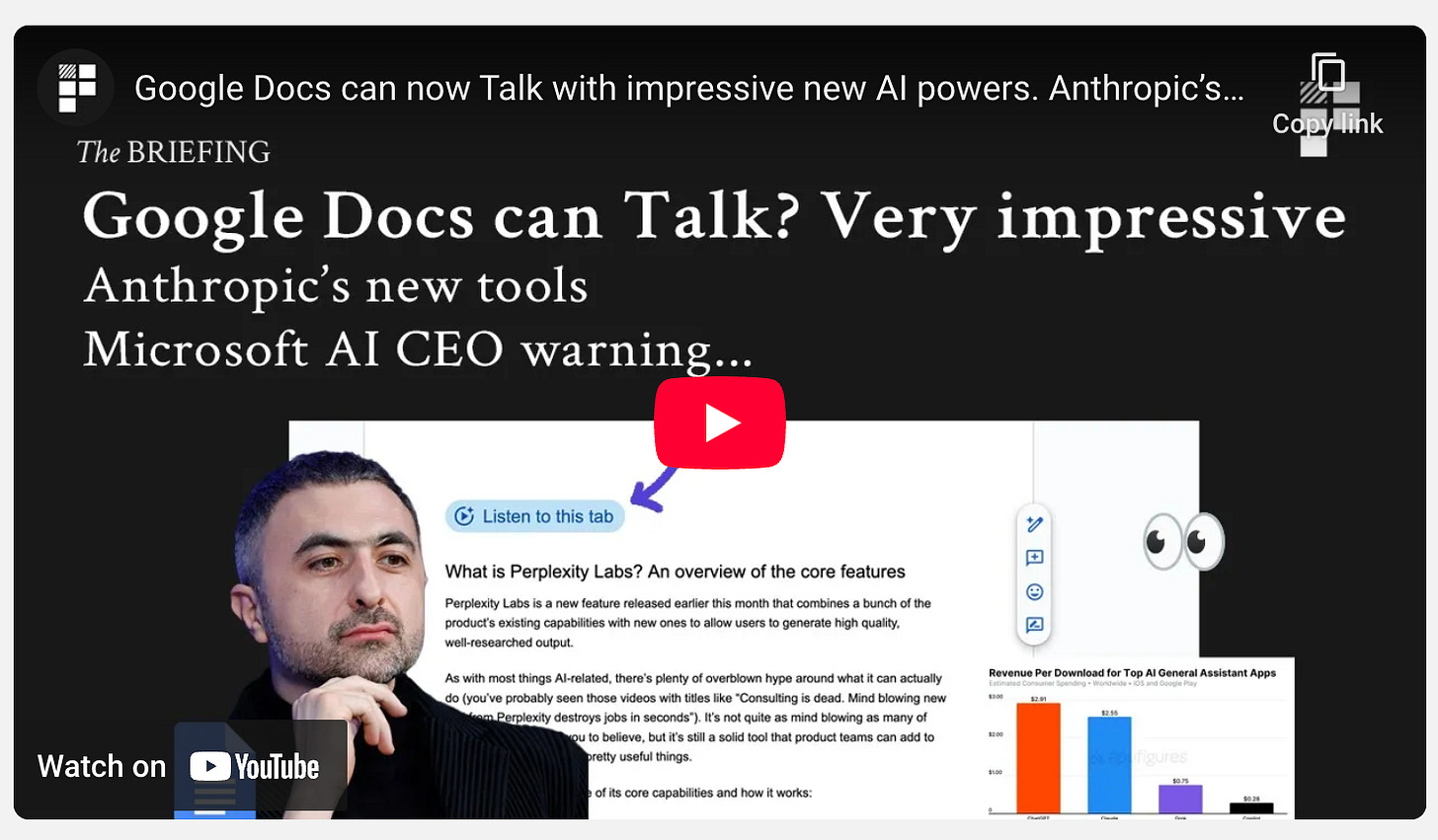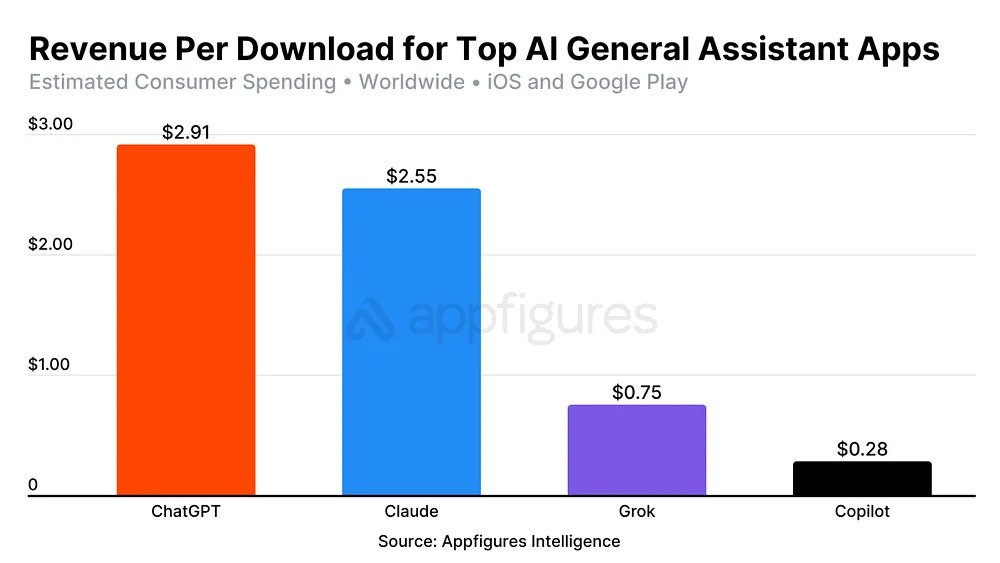Google Docs, Excel and Grammarly ramp up the race for AI workplace dominance
Plus: How AI is impacting costs and revenue at DuoLingo, Snap and Reddit, How Linear uses “Quality Wednesdays”, Should AI interview your next candidate?
Hi product people 👋,
Coming up this week, a series of new releases from Google Docs, Excel and Grammarly sees the battle for workplace productivity hot up. One of these companies is actually even considering renaming itself after a high profile acquisition, which could see it adopt a new name that’s pretty apt for an AI productivity company.
Plus, a new study explores whether AI might be better at interviewing your next hire, how AI is impacting revenue and operational costs at DuoLingo, Snap and Reddit and a new To-Do app with a twist.
Happy Friday and enjoy the rest of your week!
Rich
Watch on YouTube | Follow me on Substack Notes
Key reads and resources for product teams
New from the Department of Product Substack this week
Knowledge Series - How to speed up engineering velocity with AI
AI isn’t only transforming the process of writing code; it can have transformational effects across a bunch of other areas, too, including writing documentation, unit tests, debugging errors and reviewing code. In this Knowledge Series, we’re going to explore some of these opportunities and others in more detail - but from a non-engineers perspective. (Department of Product)
Strategy - How purchasing behavior may evolve due to AI
AI is poised to transform shopping behaviors across five purchase categories—impulse, routine essentials, lifestyle, functional, and life purchases—by automating research, recommendations, and transactions, but its impact will vary by category. This piece from Andreessen Horowitz explores this in more detail. (A16z)
Process - How “Quality Wednesdays” ensures Linear’s teams build a high quality product Linear published a new piece outlining how its product and engineering teams build high quality software. Each week, every Wednesday, engineers identify and fix minor imperfections - not just bugs - that degrade the user experience. (Linear Blog)
Skills - How to bring more rigour to your long term thinking abilities Nick Foster, a futurist and designer who has worked at Google X, Sony, and elsewhere, says that most of us struggle because we tend to fall into one pattern of thinking about the future. (Harvard Business review)
How AI is impacting product operational costs and revenues - insights from DuoLingo, Snapchat and Reddit
DuoLingo’s CEO says the costs of powering the company’s AI features are actually lower than expected. The company had previously warned that scaling Max’s AI features would knock gross margin down three percentage points for 2025, yet the Q2 update says the decline will be only about one point, crediting “lower-than-expected AI costs.” The company is also deploying AI in areas across its business - including writing course content, which has had a mixed response from users - but DAUs are up 4x since 2019. One new feature in particular boosted DAUs, time spent in-app and free to paid conversion - all at once.
We have rarely seen a feature move more than one of these metrics, let alone all three. - Duolingo CEO
Snap’s operational costs have increased with the rollout of new AI features. Infrastructure cost per daily active user (DAU) was $0.84 in Q2 2025, up from $0.80 in Q2 2024. This reflects higher costs to support increased user engagement and AI-powered features.
On Reddit, new AI-powered tools like Reddit Insights (for brand intelligence) and Conversation Summary Add-ons (which surface positive community discussions below ads) are helping advertisers target audiences more effectively. These features have led to higher clickthrough rates (+10% vs. standard image ads) and a 2x increase in Return on Ad Spend (ROAS), making Reddit more attractive to potential advertisers and increasing ad revenue. Reddit’s advertising revenue reached $465 million, which is an 84% increase compared to the same quarter last year. Not all of this can be directly attributed to this new AI feature, of course, but given the boost in ROAS, it will be a major contributor in the future.
Google Docs, Microsoft Excel and Grammarly battle for AI workplace dominance
Google Docs is getting a new feature that will use Gemini to read the document out loud. You can customize Gemini’s AI audio output with different voices and playback speed. Doc authors can also add Play buttons to the document to allow readers to listen to docs. Handy for scenarios where you might want to catch up with a document on your morning commute or walk with the dog. The results are actually pretty impressive. See a demo of it in action here.
Microsoft is also adding some new AI features to its products with the introduction of a new COPILOT function. The function works a lot like Google’s own AI function and lets users do things like summarize content, perform sentiment analysis and categorize cell data.
Grammarly has introduced a major redesign of its core app which builds on top of Coda - the document creation app it acquired earlier this year. Like Notion, it’s a “block-first” approach that lets you insert tables, columns, rich text blocks and other widgets plus a new bunch of AI tools. This includes AI Agents that can detect plagiarism and AI generated content as well as a “Reader Reactions” tool that lets you pick a reader persona and get feedback on your writing based on that persona.
Grammarly raised $1 billion earlier this year to fund its acquisition spree and its CEO recently posed the question of whether it should rename its entire company to match one of its acquisitions - Superhuman. The feedback seemed to overwhelmingly support the idea and to be fair, Superhuman is a strong name that reflects that type of AI-first workplace productivity business it’s now trying to build.
In other news…
Linear has released a new feature called “Cursor Background Agents” that allows product teams to delegate work to an AI agent through Cursor. Once the task is complete, the Cursor agent will update the issue automatically with a PR.
Anthropic has joined Google and OpenAI with the launch of their own “learning modes” for Claude. Anthropic is pitching the product directly to junior developers who need to learn new skills as well as new joiners who want to get up to speed quickly with a codebase. Anthropic admits that adopting these tools may initially hit productivity but that the long term benefit in teaching developers to understand code properly will pay off over time. A spokesperson said “Our approach helps them learn as they work, building skills to grow in their careers while still benefitting from the productivity boosts of a coding agent.”
Google’s AI Mode can now help users complete tasks, starting with making restaurant reservations. It searches multiple platforms, finds real-time availability, and links users directly to booking pages.
Tools you can use
Userjot - allows users to submit, vote on, and discuss ideas so product teams can determine what features to build next, prioritizing what your user base actually wants.
Paradigm - an AI powered spreadsheet startup that lets you enrich data from verified sources. Its AI agent also lets you assign work to it. After raising $7m in funding, it’s been in a closed beta but this week released to the public.
Cobot - a to-do app with an AI twist: it not only helps you manage your tasks - it will do them for you.
📈 Product data and trends to stay informed
So far this year, ChatGPT’s mobile app has made $1.35 billion, up 673%. Claude is a close second when it comes to revenue download per app but ChatGPT’s dominance in downloads means this is largely irrelevant. The ChatGPT app has now been downloaded ~690 million times globally, compared with Grok’s 39.5 million. In 2025 alone, it has been downloaded 318 million times, up 2.8x vs 2024.
95% of generative AI pilots at companies are failing to achieve rapid revenue acceleration with only about 5% succeeding. A new piece of research from MIT is based on 150 interviews with leaders, 350 employees and 300 public AI deployments. More than half of generative AI budgets are devoted to sales and marketing tools, yet MIT found the biggest ROI in back-office automation - eliminating business process outsourcing, cutting external agency costs, and streamlining operations.
Jira is still the most widely used product development platform: but it largely depends on the size of the company. For companies with 10,000+ employees, virtually all of them use Jira but for smaller companies, Linear is almost as popular. GitHub Copilot remains the most popular tool for engineers with 83% of developers saying they use an AI tool for code at work. Full annual developer report from Pragmatic Engineer here.
Use cases for voice assistants haven’t really changed much over the past few years. New analysis shows checking the weather, playing music and setting timers remain some of the top use cases. Will the AI-infused newer devices change user behavior?
A new study released this week suggests that AI is better than humans at interviewing new hires. 70,000 applicants for customer service jobs in the Philippines were randomly assigned to be interviewed by a human recruiter, an AI voice agent, or given a choice between the two - but human recruiters always made the final hiring decisions. The AI interviews increased job offers by 12%, job starts by 18%, and 30-day retention by 17% compared to human-led interviews. 78% of candidates said they would prefer to be interviewed by AI.
Digital twins can achieve up to 85% accuracy for predicting missing survey data and backfilling responses. New analysis exploring synthetic users and data by NN Group.
Paid subscribers get the full DoP Substack including: The Knowledge Series for sharpening your tech skills, AI tutorials for putting AI into practice at work and DoP Deep dive reports to learn from the world’s top tech companies.



